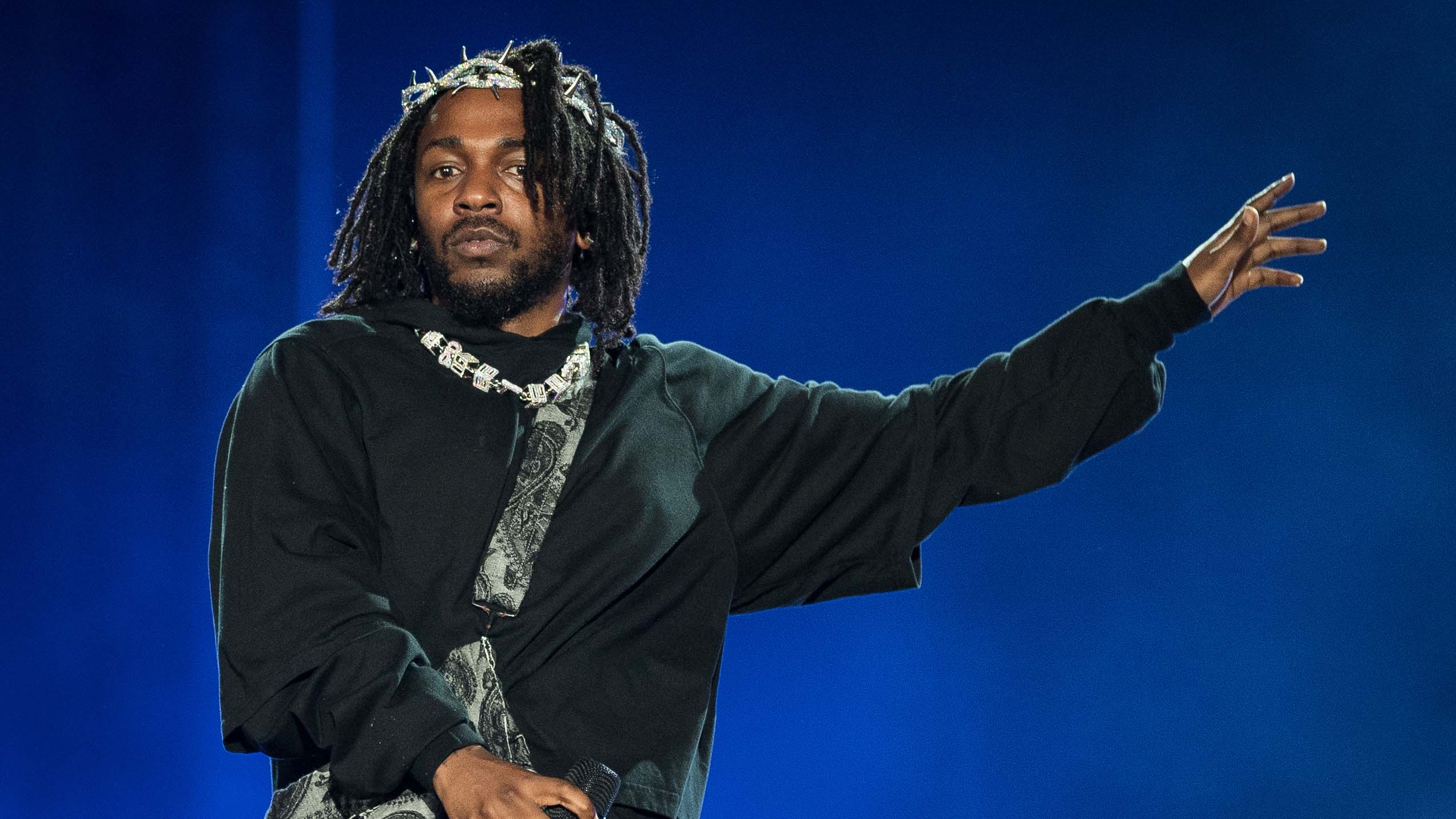5 songs you need to hear by... Kendrick Lamar
Over a dazzling five-album run, Compton's Kendrick Lamar has cemented his status as one of the greatest rappers of the 21st century

Having survived a tough upbringing in Compton, LA, Kendrick Lamar first entered the public eye via late noughties co-signs from heavyweight rappers like Lil Wayne and The Game.
Since then, he's cemented his status as one of the world's greatest rappers with a critically acclaimed five-album run culminating in the release of the deeply personal Mr. Morale & The Big Steppers last May.
Over the years, Lamar has developed a wide range of sounds; there's the high-octane LA street rap bravado of good kid, m.A.A.d. City, the dark, twisting, improvisational jazz fusion of To Pimp A Butterfly, and the polished, conscious hip-hop storytelling of triple-platinum 2017 record DAMN.
Given that his back catalogue stretches across two decades and spans various periods of reinvention, selecting five definitive Kendrick tracks isn't easy. Taking in billboard-smashing classics and deeper cuts that could've easily never seen the light of day, this list underlines some of the Compton rapper's most essential work.
1. Money Trees - good kid, m.A.A.d city (2012)
An NPR interview with long-time collaborator DJ Dahi highlights the inspiration behind the beat for Money Trees, arguably Kendrick Lamar's best-loved song. The Californian producer sampled the dreamy intro of indie-pop duo Beach House's Silver Soul, a sprawling, softly psychedelic six-minute track that couldn't be further from Los Angeles hip-hop.
Melding together chorus-drenched guitar and an ethereal synth organ, the seven-second snippet is reversed and looped by Dahi, whose tweak gives the ambient melody an addictively haunting quality. Add booming kicks, heavy subs and Kendrick's unforgettable "Ya bish" refrain, and you can see why it's one of his biggest tracks.
Money Trees was featured on breakout 2012 album good kid, m.A.A.d city, an accomplishment in cinematic storytelling that charts a chaotic day in the life of a 16-year-old Kendrick. Narrating burglaries, car chases, backseat freestyles, and a brief fling with local girl Sherane, the record explores the deep ramifications of poverty and crime in Compton.
Want all the hottest music and gear news, reviews, deals, features and more, direct to your inbox? Sign up here.
Money Trees' ruminations on the transformative power of cash — aided by an explosive Jay Rock verse and the hook "I been hustling all day… just to say / Money trees is the perfect place for shading" — powerfully captures the album's essence.
2. The Blacker The Berry - To Pimp A Butterfly (2015)
The 2015 release of To Pimp A Butterfly, with its experimental jazz fusion sound, sent shockwaves across the hip-hop world. Lamar's third album was also notable for its increased engagement with socio-political issues, chiefly the persecution of Black citizens in 21st century America.
The Blacker The Berry represents that vision in microcosm; against a chilling hip-hop beat that blends eerie piano with twists and shrieks of distorted guitar, Lamar espouses African American pride and rages against a hostile state with lyrics like "You sabotage my community, making a killing / You made me a killer", before highlighting his own perceived hypocrisy in the line "So why did I weep when Trayvon Martin was in the street? / When gang banging made me kill a n***** blacker than me? Hypocrite!"
Recorded by iconic producer Terrace Martin, the track also features a brilliant hook from Jamaican dancehall artist Assassin. Packing in tons of clever wordplay centred around Black empowerment, he booms "Man a say they put me inna chains, cah' we black / Imagine now, big gold chains full of rocks… the whip left scars pon' me back / But now we have a big whip parked 'pon the block."
An explosive, emotive look at African Americans' socio-political status in 2015, The Blacker The Berry caused some controversy, with Lamar clarifying his contradictory lyrics in an interview with MTV. "Understand where I come from before you make any remarks," he said. "I did a lot to tear down my own community, so for you to not recognise that… Please learn."
3. untitled 02 | 06.23.14 - untitled unmastered. (2016)
It's a testament to Kendrick Lamar's extraordinary depth of artistry that one of his most popular songs is on an untitled, unmastered collection of tracks that didn't make the cut for To Pimp A Butterfly.
Released in 2016, untitled unmastered contains some special work, not least the 7-track EP's second offering, a dark, intensely jazzy track laced with bursts of quivering saxophone and descending piano jingles that build a tense, uncertain atmosphere throughout. Sonically, it's probably more representative of T.P.A.B than The Blacker The Berry in many ways, although it swerves more politically-oriented subject matter and instead dives into the Compton lyricist's conflicted relationship with fame and success.
One of Lamar's most distinctive talents is his ability to use his voice as a hugely versatile instrument in its own right, and on untitled 02, that skill is showcased excellently. He skates between loud, echoing rallying calls, husky, high-pitched melodic vocals, and deep, monotone bars that skip briskly alongside the track's rumbling, trap-influenced beat.
If you're after any proof of Kendrick Lamar's belief in tight, narrative-driven concept albums, just consider the fact that untitled 02 was deemed surplus to To Pimp A Butterfly's requirements.
4. DUCKWORTH - DAMN. (2017)
DAMN.'s closing track is an outstanding example of Lamar's storytelling ability. DUCKWORTH recounts the true tale of how the course of hip-hop history was changed by a chance encounter between Anthony 'Top Dawg' Tiffith (a gang leader who later founded Lamar's label, Top Dawg Entertainment) and KFC worker Kenny 'Ducky' Duckworth (Kendrick's father).
Having heard that Anthony had previously robbed his restaurant and shot the manager, Ducky won his approval by serving him free chicken. This move meant Ducky's life was spared during a later robbery, a decision that according to Lamar, "changed both of their lives".
The revelation that "if Anthony killed Ducky, Top Dawg would be serving life / While I grew up without a father and die in a gun fight" is remarkable — that the rapper withheld this personal story until his fourth album, with its linear structure and focus on moral conflict, makes the song even more impressive.
An intricately-curated 9th Wonder/Bēkon instrumental gives this tale the perfect foundation; its main melody chops up Ted Taylor's 1978 soul track Be Ever Wonderful, while sliced-up segments of Yugoslav rock band September's Ostavi Trag and Australian group Hiatus Kaiyote's Atari provide additional harmonies and interludes throughout.
On DUCKWORTH's first verse, Lamar raps "Life is one funny motherfucker / A true comedian, you gotta love her." Having taken in the song's remarkable story, it's hard to disagree with that.
5. Mother I Sober - Mr. Morale & The Big Steppers (2022)
The fact that Mother I Sober is the least-streamed song on Mr. Morale & The Big Steppers (which we analysed in-depth in our 'Making Mr. Morale' feature) is more of an indication of its gruelling subject matter than its quality.
With the help of a tortured-sounding two-line hook from Portishead's Beth Gibbons — "I wish I was somebody / Anybody but myself" — Lamar explores the process of understanding and overcoming through therapy the cycles of generational trauma that led to his infidelity and emotional abuse of long-term partner Whitney Alford.
As he unpacks accusations of sexual abuse against his cousin and details the abuse his mother faced, the rapper's voice is subdued. His sombre reflections are amplified by a moody piano refrain that according to Dissect Podcast host Cole Cuchna, "make[s] use of the inverted pedal tone, [...] when a single note repeats over and over while other chords move around it. Pedal tones are known to create emotionally resting, meditative musical environments, perfect for the kind of deep introspection heard on Mother I Sober.”
Closing with a spoken word outro from Alford, who states "I'm proud of you. You broke a generational curse", the song isn't one you'll hear blasted out of a pub jukebox; however, it's an essential documentation of the journey Kendrick Lamar has been on as an artist and a human being.
Fred Garratt-Stanley is a freelance music, culture, and football writer based in London. He specialises in rap music, and has had work published in NME, Vice, GQ, Dazed, Huck, and more.

